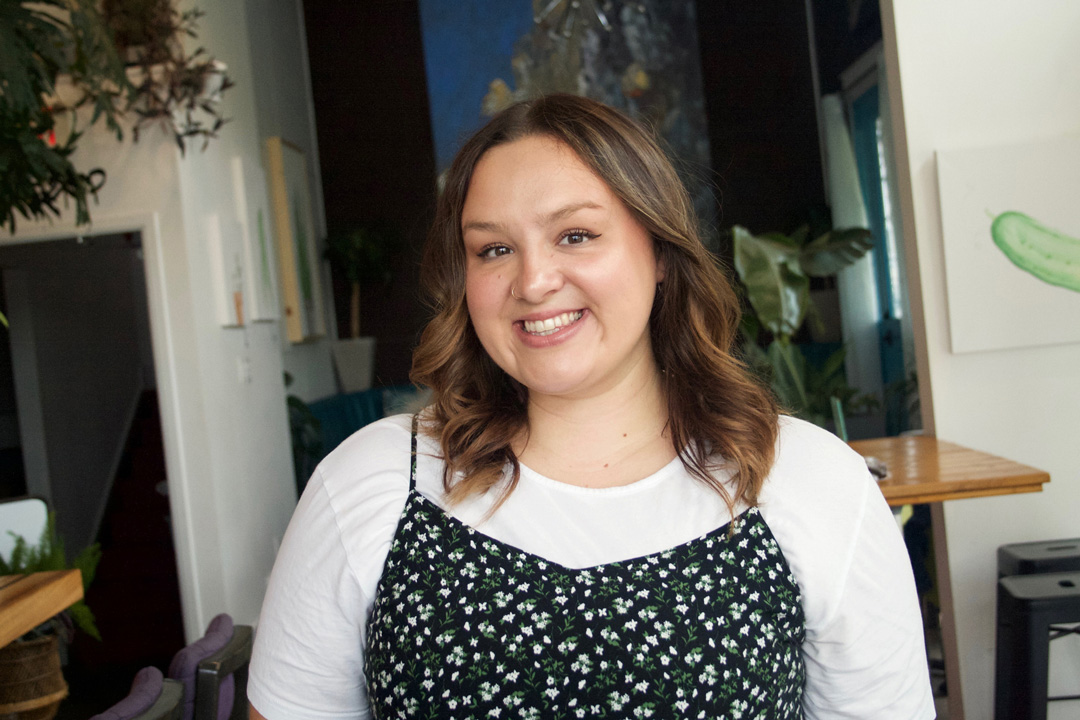
Exploring what it means to be human
USask graduate Marley J. Duckett studied human beings, past and present, in the Department of Archaeology and Anthropology
By Shannon BoklaschukMarley J. Duckett’s first anthropology class at the University of Saskatchewan (USask) had a big impact on her.
She recalls sitting in a large lecture hall in the Arts Building as her professor crossed the stage and held up a well-known object in her right hand, a toothbrush, and a lesser-known object in her left hand, a tongue scraper. While students in the class indicated they were comfortable using a toothbrush, few agreed they would use a tongue scraper—also an effective hygiene product—because, as Duckett noted, “people tend to use the familiar and privilege it above the unknown.”
“By the end of the lecture, many students agreed they were going to try the tongue scraper, myself included,” Duckett said.
“It was my introduction to cultural relativism and the anthropological pursuit to study the differences and similarities between cultures. Perhaps unsurprisingly, I find anthropology compelling because it studies the human experience. It is a scientific lens through which to better understand the world and my place in it, and that matters to me.”
That interest in understanding the human experience, both past and present, inspired Duckett to complete a Bachelor of Arts degree in anthropology in USask’s College of Arts and Science in 2015. Since then, she has also completed a Master of Arts degree in anthropology, which she will officially receive during USask’s 2022 spring Convocation in June.
“It is an incredible feeling of accomplishment, pride and relief,” she said of completing her graduate degree. “I have always loved to learn. I enjoyed school as a child and as a high school student. At USask, I found drive, purpose, experience and friendship in my undergraduate and graduate classes. I have loved my education fiercely; I have learned so much about myself through being in school.”
As a graduate student, Duckett conducted research under the supervision of Dr. Clinton Westman (PhD), head of the Department of Archaeology and Anthropology in the College of Arts and Science. Her master’s thesis, titled “Energy Consultations on Treaty 8 Lands: The Effects of Oil Extraction on Peerless Trout First Nation,” focused on resource extraction and consultation policies—specifically, consultation policies concerning oil and gas and how they impact Indigenous communities in northern Alberta.
“I worked with participants from Peerless Trout First Nation. Through ethnographic research methods, I collected data that suggests that consultation process and policy do not adequately incorporate Indigenous perspectives. I suggest ways for new consultation policies to work collaboratively with Indigenous voices to create policy that better supports Indigenous-led resource extraction projects in Alberta,” Duckett said.
“Our planet is in crisis,” she added. “Climate change, land degradation and unregulated resource extraction can, and is, causing serious damage to the Earth. I chose to study this research area because I wanted to contribute to the voices asking for more equitable management, law and rights over processes that impact the environment.”
Duckett, who was born and raised in Regina, received several scholarships and bursaries as a USask student, including support from the Northern Scientific Training Program, the Social Sciences and Humanities Research Council (SSHRC), the Department of Archaeology and Anthropology and numerous Graduate Teaching Fellowships. She has served on the executive of ARCHAIA, the USask Archaeology and Anthropology Graduate Students’ Association, and, earlier this month, she was honoured with the Outstanding Graduating Anthropology Student Award from the Canadian Anthropology Society.
In addition to a love of learning, Duckett has also discovered a passion for teaching at USask. She has taught ANTH 111.3, a first-year introductory anthropology course, and has worked on a contract basis with the Gwenna Moss Centre for Teaching and Learning. Now, with her Master of Arts degree complete, she plans to continue teaching, writing, publishing and working in the Saskatoon community.
Outside of her studies at USask, Duckett is known as a local theatre artist and playwright whose first play, Stone Picker, was produced through Live Five Independent Theatre’s Short Cuts Festival. She recently directed Breaking the Curse, presented by 25th Street Theatre and Ferre Play Theatre. She also co-founded LadyBits Improv Comedy Collective to support women in comedy and performs with Saskatoon Soaps Improv Comedy. Previously, as a USask student, she performed with the Greystone Singers for six years, touring throughout Saskatchewan, China and Eastern Europe with the choir.
Duckett said she has a deep love for the arts in Saskatchewan and plans to continue working in this area post-graduation.
“Currently, I am looking forward to singing in Carmen with Saskatoon Opera and acting in a Fringe play this summer,” she added.
When asked why she chose to study at USask, Duckett said she came to the university for the programs and stayed for the people, noting the strong sense of community that is fostered in the College of Arts and Science. The Department of Archaeology and Anthropology is also known for offering excellent programs, she said, “so I continued my education here because I knew that my department, and specifically my supervisor and committee, were the best people to help me accomplish my educational goals.”
Duckett said she was continually inspired by the people she studied with at USask, and her research greatly benefitted “by being in the company of quality scholars.”
“The College of Arts and Science builds students from the ground up, or at least that’s how it felt with me. I came to the university a very young high school graduate with not one clue what to do with myself. I would not be here today without the many teachers, advisors and friends that I (met) throughout my time here,” she said.

